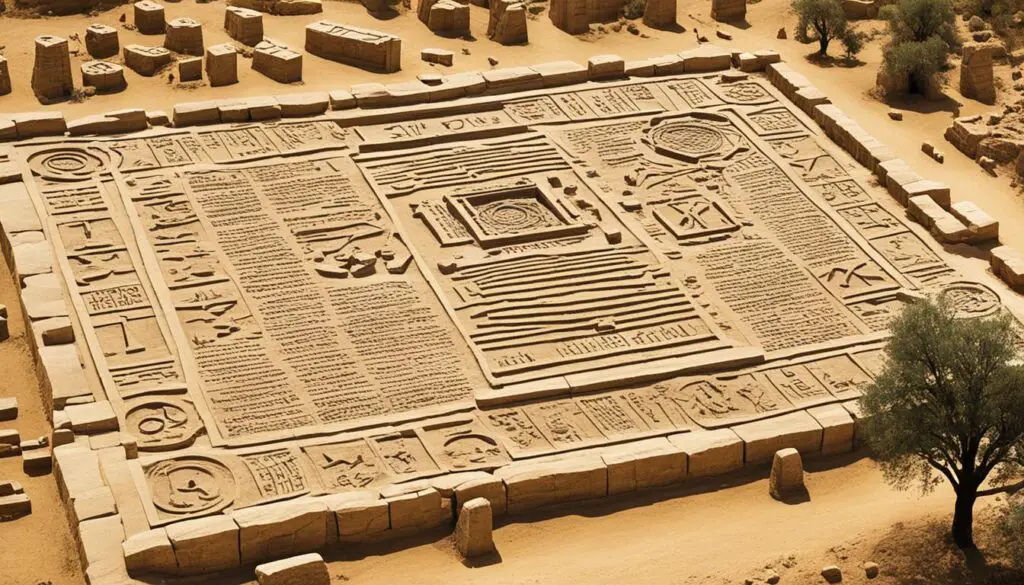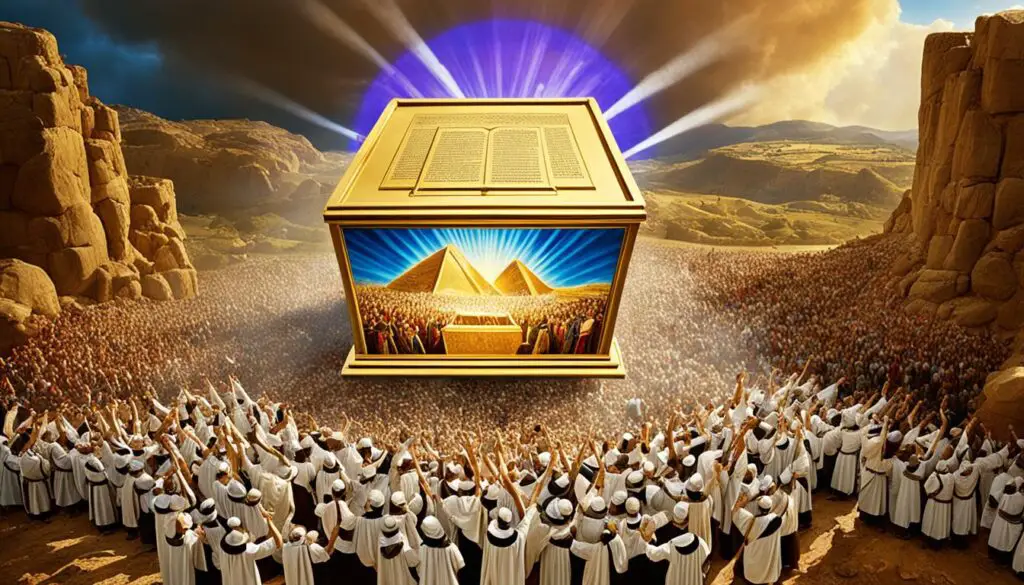Shiloh in the Bible is a topic that intrigues scholars and believers alike. This ancient city holds immense historical and religious significance, serving as the capital of Israel and the resting place of the tabernacle for over three centuries. The name “Shiloh” appears in the Book of Genesis as a reference to the Messiah, adding to its cosmic importance.
Understanding the meaning of Shiloh requires delving into its biblical context and historical background. Archaeological discoveries have shed light on this enigmatic city, unveiling its Canaanite origins and its role as Israel’s first capital. These findings have enriched our comprehension of its significance and brought its biblical narrative to life.
In this article, we will explore the mystery of Shiloh, examining its history, its geographical location, its cultural and religious practices, and its prophetic and eschatological meanings. By unraveling the enigma of Shiloh, we will gain a deeper understanding of its importance in the Bible and its relevance in the present day.
Key Takeaways:
- Shiloh in the Bible holds immense historical and religious significance.
- It served as the capital of Israel and the resting place of the tabernacle.
- The name “Shiloh” appears as a reference to the Messiah in Genesis.
- Archaeological discoveries have enhanced our understanding of Shiloh’s origins and role in biblical history.
- Exploring Shiloh allows us to gain valuable insights into the rich tapestry of the Bible.
The Historical Significance of Shiloh
Shiloh holds major historical significance in the biblical narrative. It was a central city in ancient Israel’s history, second only to Jerusalem. The Israelites assembled in Shiloh on multiple occasions, and it served as the capital city during the time of Joshua.
The historical significance of Shiloh is further confirmed by archaeological evidence that aligns with biblical accounts.
The story of Shiloh encompasses the early Canaanite history, the period of the judges, and the era of Eli and Samuel. This rich history provides valuable insight into the religious, cultural, and political dynamics of ancient Israel.
One of the key events that took place in Shiloh was the establishment of the tabernacle, which served as the central place of worship and sacrifice for the Israelites. The presence of the tabernacle in Shiloh solidified its significance as a religious and spiritual center.
Additionally, Shiloh was a crucial location for the Israelite tribes to gather and make important decisions. It was the site where the land was allotted to each tribe, and where major religious festivals were celebrated.
Historical Periods and Significance:
1. Early Canaanite History: Shiloh, originally a Canaanite city, was conquered by the Israelites during the time of Joshua. This conquest marked the beginning of its significance in Israelite history.
2. Period of the Judges: Shiloh became the central location for the Israelites during the period of the judges. It served as the political and religious hub, housing the tabernacle and hosting important gatherings.
3. Era of Eli and Samuel: Shiloh was also the setting for significant events involving notable biblical figures, such as Eli the priest and the prophet Samuel. These events shaped the spiritual and political trajectory of Israel.
Overall, the historical significance of Shiloh lies in its role as a major city in ancient Israel, its function as the capital during Joshua’s time, and its association with prominent biblical figures. The archaeological discoveries and biblical accounts have shed light on the importance of Shiloh in shaping Israelite history and the religious practices of its people.
Below is a table summarizing the historical periods and their significance in Shiloh:
| Historical Period | Significance |
|---|---|
| Early Canaanite History | Conquest by Israelites, marking the beginning of its significance |
| Period of the Judges | Became the political and religious hub of Israel, hosting the tabernacle |
| Era of Eli and Samuel | Site of significant events involving prominent biblical figures |
Geographical Location of Shiloh
Shiloh, an ancient city of great historical and biblical significance, is located in present-day Israel. Situated in the central hill country of Samaria, Shiloh occupies a strategic position in the region.
The city’s geographical location played a vital role in its prominence as a capital city in ancient Israel. Shiloh was nestled near a fertile valley that provided sustenance for its population. With access to reliable water sources, the city flourished amidst its surroundings.
One distinct feature of Shiloh was its positioning on a tel, a mound with steep slopes. This natural terrain offered a natural defense against potential enemies, adding an extra layer of security to the city.

Archaeological Discoveries in Shiloh
Archaeological excavations in Shiloh have unearthed a treasure trove of findings that provide valuable insights into its historical significance. Led by renowned archaeologist Prof. Israel Finkelstein in the 1980s, these excavations have brought to light compelling evidence that aligns with the biblical accounts of Shiloh.
Among the remarkable discoveries are sacrificial animal bone deposits, cultic vessels, and the remains of a religious center dating back to the time of Joshua. These findings offer tangible proof of the tabernacle’s existence in Shiloh, as described in the Bible. The presence of sacrificial bones demonstrates the religious practices carried out in this ancient city.
Furthermore, the unearthing of pottery shards and remnants of ancient buildings corroborates the biblical narrative of Shiloh as a thriving capital and religious center. These findings speak volumes about the rich history and cultural significance of Shiloh in ancient Israel.
These archaeological discoveries not only shed light on the material remains of Shiloh but also deepen our understanding of the religious and cultural practices of the time. They provide tangible evidence of the profound impact that Shiloh had on the lives of the ancient inhabitants and its pivotal role in shaping the faith and identity of the Israelites.
Theological Themes in Shiloh
Shiloh holds significant theological significance in the Bible, particularly through the presence of the tabernacle. This sacred structure symbolizes God’s dwelling among His people and the centralization of worship. In Shiloh, the tabernacle served as a physical place of sacrifice, prayer, and communication with God. It was here that the Israelites sought guidance and experienced divine encounters.
The tabernacle in Shiloh played a crucial role in the religious and spiritual life of ancient Israel. It also foreshadowed the future temple in Jerusalem, which would become the permanent dwelling place of God’s presence. Additionally, the presence of the tabernacle in Shiloh carries Messianic significance. It alludes to the coming of the Messiah, who would fulfill God’s covenant and bring ultimate redemption.
The theological significance of Shiloh lies in its deep connection to God’s divine plan and His covenant relationship with His people. Through the tabernacle, God established a tangible way for His chosen people to approach Him and experience His presence. Shiloh functioned as a religious center, gathering devout worshipers and facilitating their spiritual journey.

“And the whole congregation of the people of Israel assembled at Shiloh and set up the tent of meeting there.” – Joshua 18:1
Key Biblical Events in Shiloh
Shiloh, mentioned in the Old Testament, was the site of several significant biblical events. It served as the assembly point for the Israelites during their early years of settling in the Promised Land. As the religious and political center of Israel, Shiloh played a vital role in shaping the course of the nation’s history.
One key event that took place in Shiloh was the selection of the land by Joshua. After the Israelites entered Canaan, the tabernacle was set up in Shiloh, symbolizing the establishment of God’s presence among His people. This further solidified Shiloh’s position as the central location for worship and religious activities.
Another significant event was the annual feast that drew the Israelites to Shiloh. As a place of pilgrimage and celebration, Shiloh brought the nation together to honor and worship God. It was during these festivities that people offered sacrifices and engaged in various religious rituals.
The interactions between the prophet Samuel and Eli the priest also took place in Shiloh. Samuel, serving as a key figure in Israel’s transition from judges to kings, received his prophetic calling while residing in Shiloh. These encounters between Samuel and Eli contributed to the establishment of Samuel as a trusted prophet and leader in Israel.
“And the child Samuel ministered unto the Lord before Eli. And the word of the Lord was precious in those days; there was no open vision.” – 1 Samuel 3:1 (KJV)
These key events in Shiloh not only shaped the religious and cultural practices of the Israelites but also played a significant role in their history and journey as a chosen nation.
| Key Biblical Events in Shiloh | Significance |
|---|---|
| Selection of the land by Joshua | Established Shiloh as the religious and political center of Israel |
| Annual feast and religious rituals | Brought the nation together for worship and celebration |
| Interactions between Samuel and Eli | Contributed to the establishment of Samuel as a prophet and leader in Israel |

The table above summarizes the key biblical events in Shiloh and highlights their significance. These events shaped the course of Israel’s history and had a lasting impact on the nation’s religious and cultural practices.
Cultural and Religious Practices in Shiloh
The cultural and religious practices in Shiloh revolved around the tabernacle and the Israelites’ observance of their faith. It was a place where the people gathered to worship, offer sacrifices, and seek guidance from God. Shiloh held a central role in the spiritual life of the Israelites, serving as a sacred site where they could connect with the divine.
At the heart of Shiloh’s religious practices was the tabernacle. This portable sanctuary was the focal point of worship, symbolizing God’s presence among His people. The tabernacle housed the Ark of the Covenant and various sacred objects, and it was where the priests carried out their duties.
“The tabernacle was a place of reverence and devotion, where the Israelites sought forgiveness for their sins and received blessings from God.”
The priests and Levites played crucial roles in the religious rituals and customs of the tabernacle. They were responsible for offering sacrifices, performing ceremonies, and maintaining the sacred space. Their duties included ensuring the proper observance of feasts and festivals, leading prayers, and providing spiritual guidance to the people.
Shiloh was not only a place of religious significance but also a site of pilgrimage and communal gathering. During the annual feast of the Lord held in Shiloh, people from all over Israel would make the journey to worship and celebrate together. This pilgrimage fostered a sense of unity among the Israelites and reinforced their religious identity as a chosen people.
The cultural practices in Shiloh were deeply intertwined with its religious traditions. As the capital city, it was also a center for political and social activities. The community living in and around Shiloh engaged in various cultural practices, including trade, agriculture, and crafts.
The customs and traditions observed in Shiloh reflected the values and beliefs of the Israelite society, creating a cohesive and vibrant community. Through their cultural and religious practices, the people of Shiloh sought to honor God, connect with their heritage, and strengthen their sense of belonging.
Prophetic and Eschatological Significance of Shiloh
Shiloh holds a profound prophetic and eschatological significance in the Bible. In Genesis 49:10, the name “Shiloh” is associated with the Messiah, foretelling the coming of a future figure who will bring peace and tranquility. This Messianic prophecy serves as a powerful foreshadowing of Jesus Christ, the ultimate fulfillment of God’s promises. The mention of Shiloh reminds us of God’s faithfulness and His unwavering commitment to His people throughout history.
Furthermore, the destruction and abandonment of Shiloh serve as a sobering reminder of the consequences of disobedience and the impending judgment upon nations. It reflects the divine judgment that can result from turning away from God and His commandments. Shiloh stands as a testament to the consequences of forsaking God’s covenant and serves as a warning against repeating the mistakes of the past.
Through its prophetic and eschatological significance, Shiloh invites us to reflect on the bigger picture of God’s plan for redemption. It points to the ultimate fulfillment of God’s promises in Jesus Christ and reminds us of the importance of remaining faithful and obedient to God’s Word.

Unveiling the Enigma of Shiloh
The mystery of Shiloh is an intriguing enigma that captivates scholars and believers alike. With its complex historical and biblical narrative, Shiloh holds a wealth of significance waiting to be unraveled. The archaeological excavations have unearthed a multitude of findings that provide valuable insights into this ancient city and its place in the Bible.
To truly understand the enigma of Shiloh, we must delve into its historical context, geographical location, theological themes, and cultural practices. By studying the biblical accounts alongside the archaeological evidence, we can piece together the puzzle and gain a deeper understanding of the mysteries surrounding Shiloh.
Shiloh mystery, Shiloh enigma, unraveling Shiloh’s significance – these keywords unlock the door to hidden knowledge. By exploring the varied aspects of Shiloh’s history and significance, we can shed light on the mysteries that have perplexed scholars for centuries.
Shiloh remains a testament to the rich tapestry of biblical narrative, inviting us to explore its secrets and uncover its hidden truths. Only by closely examining the intricate details can we truly appreciate the significance of Shiloh in the grand tapestry of biblical history.

As we embark on this journey of discovery, the enigma of Shiloh awaits us. Let us unravel its secrets and unlock the hidden wisdom that lies within, shedding light on the rich history and deep significance of this ancient city.
Conclusion
Exploring Shiloh in the Bible reveals a captivating journey into the past, shedding light on its historical, archaeological, theological, and prophetic significance. As the capital of Israel and the home of the tabernacle, Shiloh holds a prominent place in biblical history. Its geographical location in the central hill country of Samaria, coupled with its cultural and religious practices, gives us a deeper understanding of the ancient Israelite way of life.
Furthermore, the mystery of Shiloh extends beyond its tangible aspects. Its prophetic and eschatological significance, particularly in relation to the coming of the Messiah, adds another layer of depth to its story. By delving into the rich tapestry of Shiloh, we unravel the enigma that surrounds it, gaining valuable insights into the intricacies of the biblical narrative.
Whether through archaeological discoveries or the theological themes woven into its fabric, Shiloh’s relevance in the Bible cannot be overlooked. It serves as a testament to God’s faithfulness, a symbol of worship and sacrifice, and a glimpse of the divine plan. Exploring Shiloh in the Bible allows us to connect with the past, gain a deeper understanding of our faith, and appreciate the enduring significance of this ancient city.
FAQ
What is the historical significance of Shiloh?
Where is Shiloh located?
What have archaeological excavations revealed about Shiloh?
What are the theological themes associated with Shiloh?
What key biblical events took place in Shiloh?
What were the cultural and religious practices in Shiloh?
What is the prophetic significance of Shiloh?
How can we unravel the enigma of Shiloh?
What is the conclusion about Shiloh in the Bible?
Source Links
- https://armstronginstitute.org/719-uncovering-the-bibles-buried-cities-shiloh
- https://biblearchaeology.org/research/contemporary-issues/51-the-shiloh-excavations/shiloh-excavations-2018/3331-shiloh-excavations-2018-intro
- https://biblearchaeology.org/member/51-the-shiloh-excavations/shiloh-excavations-2018







